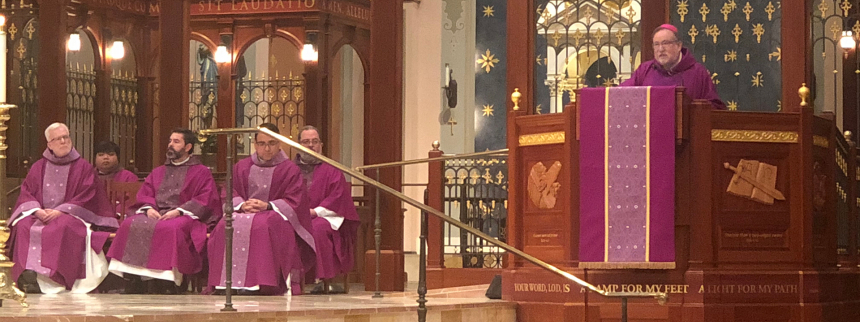
Following is Bishop Jaime Soto's Homily given on Wednesday, January 22, 2020 at the Cathedral of the Blessed Sacrament in Sacramento on the occasion of the anniversary of Roe v. Wade.
---
The governor recently announced that he wanted to make California a “no-kill” state. He was speaking about ending the practice of euthanizing animals. What he proposes to do for animals may be an admirable aspiration but it was hard to listen to his reasoning and not hear the silent yet deafening disregard for the life of the unborn child. The governor’s focus on ending the practice of euthanizing animals as well as the media attention given to this, acknowledge a still lingering instinct that there is something unsettling about taking a life, even an animal life. That the abortion of human children continues with the support of the governor, the legislature and the courts requires a deep level of denial about the most basic human instinct to protect and preserve human life. A pervasive and stubborn ideology continues to defy the reality of human life in the womb and has brutally anesthetized too many people against the persistent, aching human instinct to preserve life, not destroy it.
In the gospel today (Mk. 3:1-6), Jesus argued with the Pharisees about this fundamental human principle challenging them, “Is it lawful to do good on the sabbath rather than to do evil, to save life rather than to destroy it?” The preoccupation of the Pharisees for a rigorous ritualistic compliance blinded them to the good religious work of healing and helping. Jesus lamented their hardness of heart. St. Athanasius, in speaking about this gospel passage, said that Jesus could heal the withered hand of the man brought to him, but he grieved that he could not heal the withered minds of his detractors.
We continue our efforts to promote a “no-kill” state for the unborn child and the dying. The practices of abortion and euthanasia have no place in human heart and should have no place in California law. This is not just a strongly held religious conviction. It is instinct deeply embedded in the human soul. It is in keeping with the truest sense of our human nature, to do good and not evil, to preserve life, not destroy it.
In our work to touch the hearts and minds of fellow Californians, we must also guard against the hardness of our hearts and the withering of our minds. The example of the young David, in the first reading (I Sm. 17:32-51), has much to teach us in this regard. David faced overwhelming odds in the shadow of the towering warrior, Goliath. With good reason, no one, not even the king, would face him. David’s example teaches us three things. David trusted in God. He used what he had, only a sling and some stones. He approached the conflict. He did not run away.
We too must continue to trust in God. We should not let ourselves be tempted to rely only on political power. There have been disappointing setbacks in this past year while also some encouraging changes that give us hope. Power can be used effectively, and we should use it. Yet, we should not let power seduce us away from trusting in the wisdom and mercy of God.
Trusting in God, like David, we use what the Lord has given us. Our many works of charity and healing can seem so meager in the face of the behemoth-like influences of culture and politics that defy our moral convictions. Trust in the tools the Lord has given us.
Religion and good reason are often shunned from public discourse in favor of a distorted notion of freedom. We should not be persuaded to retreat from the public square. We have good news and good reason to stay engaged in the efforts to resist the “throw-away” society and cultivate a nation where there is liberty and justice for all.
After his frustrating debate with the Pharisees in the gospel, Jesus turned and gave all his tender attention to the man with the withered hand. In this very personal encounter Jesus was most effective. He changed the life of one person. The rest of the crowd left to plan how to kill the Christ.
Trust in God. Use what he has given us. Stay engaged in the struggle. Focus on doing the good the Lord enables us to do, even when it is with only one person at a time. The Lord will accomplish more than we can ask or imagine.

